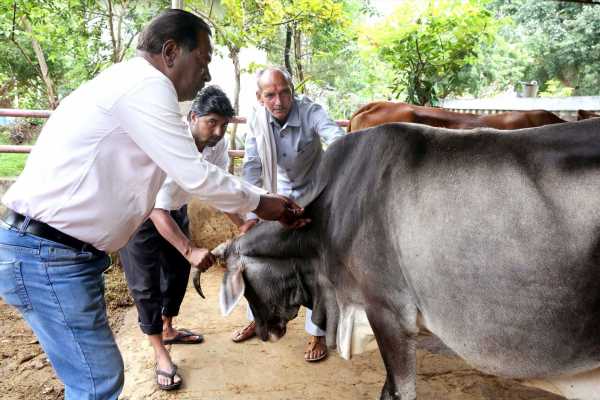Monsoon nearing, fear of lumpy skin disease in cattle resurfaces
The Centre has issued an advisory to states to speed up the preventive vaccination process.
With the deadly lumpy skin disease (LSD) wreaking havoc on the country’s livestock last year, the Centre has directed states to complete the preventive vaccination drive at the earliest.
It has also sought other remedial measures, such as vector management in high-risk areas as well as proper sanitation and hygiene in cattle.
The advisory comes weeks ahead of the monsoon season, when chances of such infections rise manifold.
“While no 100 per cent effective cure for LSD is known till date, vaccination is an effective way to prevent it.
“Accordingly, states and Union territories (UTs) are advised to immediately start preparations for annual preventive vaccination of susceptible and eligible cattle populations against LSD, according to the control guidelines circulated to states and UTs,” the central advisory, issued a few weeks ago, said.
It added that proper liaison may also be established with panchayat and municipal bodies and local administration for strict implementation of biosecurity and sanitary measures. These steps include vaccination and movement control of animals, whenever required.
LSD is a contagious viral infection that affected cattle and caused fever as well as nodules on the skin. It also led to death in many cases.
LSD was first reported in 2019 in Odisha. After that, it has spread to multiple states in the country. Last year, it created havoc in Rajasthan and Gujarat, leading to large-scale morbidity of cattle.
The disease officially led to the death of more than 180,000 cows. However, farmers and cattle rearers said that death count was even higher. Some market players said the impact of LSD on the country’s milk production has not been very big.
This is because the disease was mostly confined to indigenous cattle varieties. However, there are many who disagree with this view. On its part, the government undertook a massive vaccination drive to control the disease apart from other remedies. It administered more than 95 million doses of goat pox vaccines, which provided almost 80 per cent immunity to animals.
Moreover, the Indian Council of Agriculture Research (ICAR) also entered into an agreement with Biovet Private Ltd for the commercial production of indigenous LSD vaccine called ‘Lumpi-ProVacind’. It was also in discussion with other firms for commercial production of the vaccine.
“It will take another six-eight months for the indigenous vaccine to become completely available for commercial use,” a senior official said.
He added the goat pox vaccine is good against LSD but just like any other vaccine, its effectiveness lies for eight months to one year. After that, another round of vaccination is required just as booster doses for Covid.
“We are insisting on speeding up the vaccination programme because during monsoon fears of any vector-borne disease are high. And, lumpy being a vector-borne disease, also sees a rise during monsoon,” the official said.
He said, according to the vaccination schedule, the worst-affected state of Gujarat has been directed to complete the vaccination drive of its 9.6 million cattle between June 1 and June 15. Rajasthan has also been directed to complete the vaccination of its 13.9 million cattle during the same period.
UP, with the largest cattle population at 18.7 million has been asked to complete the drive between May 16 and May 31.
“Vector management, disinfection and cleanliness shall also be focused during the monsoon, especially in the high-risk areas (like goushalas, common grazing grounds, animal movement areas, animal gathering areas, hospitals, border areas of affected states/districts and dairy farms), along with vaccination programmes,” the advisory also said.
Source: Read Full Article


